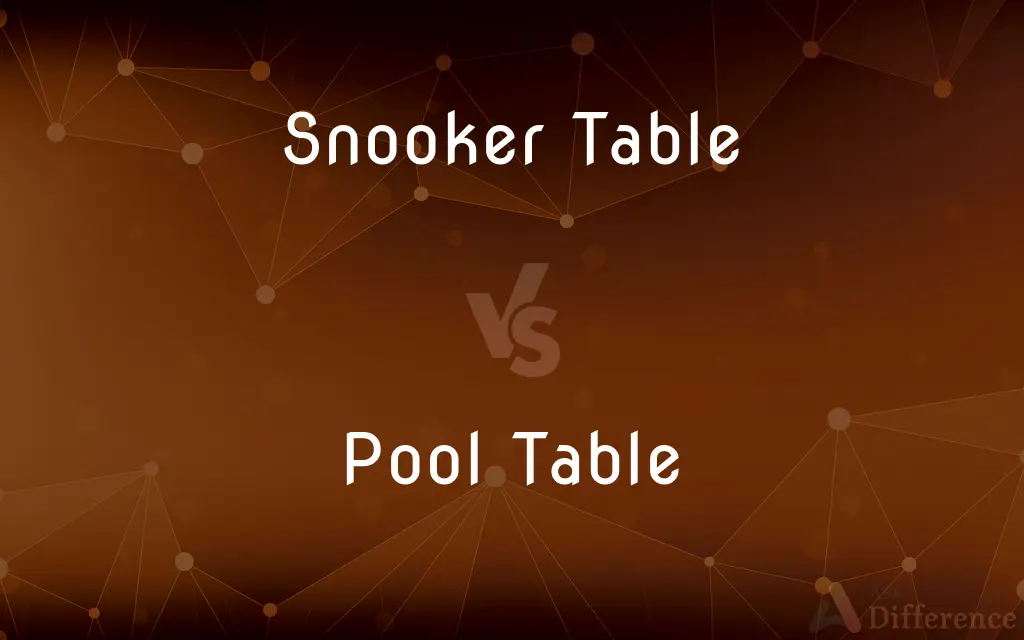Snooker Table vs. Pool Table — What's the Difference?
By Urooj Arif & Fiza Rafique — Published on October 16, 2024
A snooker table is larger, typically 12x6 feet, with narrower pockets and smaller balls than a pool table, which is commonly 9x4.5 feet with wider pockets and larger balls.

Difference Between Snooker Table and Pool Table
Table of Contents
ADVERTISEMENT
Key Differences
Snooker tables are larger than pool tables, with standard dimensions of 12 feet by 6 feet, designed for the game of snooker. They have tight, rounded pocket openings and smaller balls, measuring about 2 1/16 inches in diameter. The cloth on a snooker table is very fine and smooth, facilitating slow, precise play.
Pool tables, on the other hand, are usually smaller, with the most common size being 9 feet by 4.5 feet for professional play, although sizes can vary for home use. The balls used in pool are larger, about 2 1/4 inches in diameter, and the table's pockets are wider, accommodating the larger balls. The cloth used on pool tables is slightly thicker than that on snooker tables, which can affect the balls' speed and movement.
The design of the pockets is a significant difference. Snooker tables have rounded pocket entrances that are less forgiving and require greater precision to pot a ball. Pool tables have wider, more open pockets, reflecting the game's faster pace and the different strategies employed.
Snooker requires a higher degree of precision due to the table's size, the smaller balls, and the tighter pockets. Pool, with its larger balls and more forgiving pockets, tends to be faster-paced and can be more accessible for casual players.
Both games have their unique cues, with snooker cues being thinner and lighter than pool cues, tailored to the finesse required for snooker shots. Pool cues are generally thicker and heavier, suitable for the more robust play of pool games.
ADVERTISEMENT
Comparison Chart
Dimensions
12x6 feet (standard)
9x4.5 feet (standard)
Ball Size
2 1/16 inches
2 1/4 inches
Pocket Design
Tight and rounded
Wider and more open
Cloth Type
Fine and smooth for slow play
Slightly thicker for faster play
Game Style
Precision and strategy
Fast-paced and accessible
Compare with Definitions
Snooker Table
Snooker tables use a very fine cloth to allow slow, controlled ball movement.
The smooth cloth of a snooker table facilitates intricate spin shots.
Pool Table
A pool table is a smaller, felt-covered table with six pockets, used for games like eight-ball and nine-ball.
Pool tournaments often feature matches on regulation-size pool tables.
Snooker Table
They are primarily used in snooker, a game of skill and strategy.
Mastering snooker involves learning to navigate a full-size snooker table effectively.
Pool Table
It has larger balls and more forgiving pockets than a snooker table.
Pocketing balls on a pool table is generally considered easier due to the wider pockets.
Snooker Table
The table's large size emphasizes strategy and precision.
A successful snooker break builds the foundation for winning frames.
Pool Table
Pool tables come in various sizes, suitable for bars, homes, and tournaments.
Bar pool tables are often smaller, making the game more accessible in social settings.
Snooker Table
It features tight pockets and small balls, requiring precise shots.
Potting a red ball into a corner pocket on a snooker table demands high accuracy.
Pool Table
Designed for a faster pace, it suits both casual and competitive play.
An eight-ball game on a pool table can be quick and dynamic.
Snooker Table
A snooker table is a large, green-clothed table with six pockets, used for playing snooker.
The World Snooker Championship is played on a full-size snooker table.
Pool Table
They support a range of pool games, each with unique rules and strategies.
Playing nine-ball on a pool table requires both precision and strategic planning.
Common Curiosities
Why are snooker balls smaller?
Smaller balls require more precision, fitting the strategic and skillful nature of snooker.
Can you play pool on a snooker table?
Yes, but it's not ideal due to the table's size, tight pockets, and smaller balls.
Is snooker more difficult than pool?
Many consider snooker more challenging due to its larger table, smaller balls, and tighter pockets.
How many pockets does a snooker table have?
A snooker table has six pockets, similar to a pool table.
What size are professional pool tables?
Professional pool tables are usually 9 feet by 4.5 feet.
What's the main difference between a snooker and pool table?
The main difference is size and design; snooker tables are larger with tighter pockets and smaller balls.
Can the same cues be used for both snooker and pool?
While technically possible, cues are usually optimized for the specific requirements of each game.
Can snooker cues be used for pool?
While possible, snooker cues are thinner and lighter, not optimized for the heavier balls used in pool.
What's the best way to transition from pool to snooker?
Practice on a snooker table to adjust to its size, tighter pockets, and smaller balls.
What cloth is used on pool tables?
A slightly thicker, more durable cloth is used, aiding faster ball movement.
What games can be played on a pool table?
Games like eight-ball, nine-ball, straight pool, and one-pocket can be played on a pool table.
Are there different types of cloth for snooker and pool tables?
Yes, snooker tables use a finer cloth for slower play, while pool tables use a slightly thicker cloth for faster ball movement.
Are pool tables always smaller than snooker tables?
Typically, yes, but pool tables can vary in size, especially for home use.
Why do snooker tables have rounded pockets?
Rounded pockets increase the difficulty, requiring greater accuracy.
How does the table size affect gameplay in snooker and pool?
The larger snooker table emphasizes precision and strategy, while the smaller pool table facilitates a faster, more accessible game.
Share Your Discovery

Previous Comparison
New Zealand Accent vs. Australian Accent
Next Comparison
Power Of Attorney vs. Legal GuardianAuthor Spotlight
Written by
Urooj ArifUrooj is a skilled content writer at Ask Difference, known for her exceptional ability to simplify complex topics into engaging and informative content. With a passion for research and a flair for clear, concise writing, she consistently delivers articles that resonate with our diverse audience.
Co-written by
Fiza RafiqueFiza Rafique is a skilled content writer at AskDifference.com, where she meticulously refines and enhances written pieces. Drawing from her vast editorial expertise, Fiza ensures clarity, accuracy, and precision in every article. Passionate about language, she continually seeks to elevate the quality of content for readers worldwide.













































